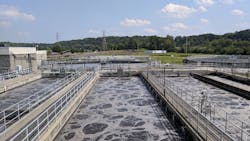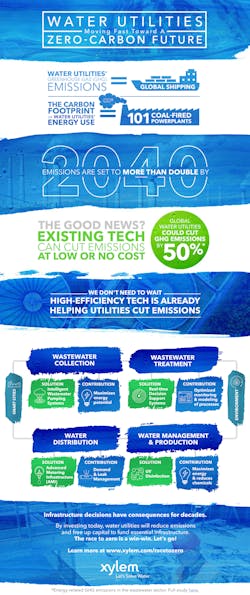Global water utilities could cut GHG emissions by 50% at low cost
Global water utilities account for approximately 2 percent of greenhouse gas (GHG) emissions – the equivalent of the world’s shipping industry. This figure is set to spiral as utilities work towards the UN’s Sustainable Development Goal of universal access to water and sanitation by 2030.
But water utilities could cut their emissions dramatically and quickly, according to a new paper from global water technology company, Xylem Inc. The paper outlines the sector’s opportunity to reduce emissions quickly and affordably with current, high-efficiency technologies.
‘Water Utilities: Moving Fast Toward A Zero-Carbon Future’ is the new white paper that explores sustainable water and wastewater processes.
The paper emphasizes that deploying available high-efficiency technologies is one of several key steps leading utilities are taking as part of their wider strategies to reduce emissions:
- Make firm commitments to reduce emissions by joining the water sector’s Race to Zero. Led by the UN’s High-Level Climate Champions for Climate Action, the Race to Zero is a global initiative, rallying companies, cities, and regions to take immediate action to halve global emissions by 2030 and deliver a healthier, fairer zero carbon world in time.
- Deploy affordable, high-efficiency technologies to make meaningful, early progress. For example, intelligent wastewater pumping systems can cut energy use by up to 70 percent in wastewater pumping by reducing inefficiencies and emergency call-outs associated with clogging. On the clean water side, leak detection technologies can eliminate real water losses, saving energy consumed in the treatment and transport or water.
- Define the supporting processes, policies and practices to get all the way to net zero. Water UK’s Net Zero 2030 Routemap details the broad range of approaches that are required to deliver on this commitment and provides specific actions to create accountability, reduce the costs and risks of the transition to net zero, and to unlock new benefits.
“Water operators have long been stewards of such an essential resource. Water infrastructure is a cornerstone of every community and local economy around the world,” said Patrick Decker, Xylem’s President and CEO. “But today’s water systems are also major sources of global GHG emissions – which is why a growing number of utility operators are showing leadership by committing to ‘net-zero’ emissions targets.”
“Readily available technologies are an important and affordable part of the roadmap in utilities’ ‘race to zero,’” continued Decker. “Combined with changes in process, policy and practice, these solutions can get utilities well on their way to net-zero emissions.”
Xylem’s initial study of wastewater infrastructure, Powering the Wastewater Renaissance, found that 50 percent of electricity-related emissions from the wastewater sector can be abated with existing technologies, such as intelligent wastewater pumping systems, adaptive mixers with variable speed drives, and real-time decision support systems. ~95 percent of this impact is achievable at zero or negative cost. Likewise, in clean water, further analysis by Xylem indicates that readily deployable high-efficiency technologies such as advanced metering infrastructure (AMI) also have a material impact on emissions.
In the UK alone, utilities could save up to 10 million tons of greenhouse gas by reaching net zero in 2030.2
“There’s an opportunity for our sector to make a huge difference, starting now,” continued Decker. “The foundations of success are available, today: affordable technology, experience, funding, collaboration and, increasingly, regulatory incentives. Water utilities can win the race to zero while delivering the essential services on which their communities’ health and prosperity depend.”
SOURCE: Xylem, via Business Wire

